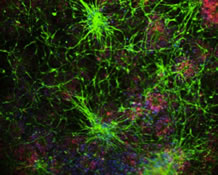Columbia University
Irving Medical Center
Neurological Institute
710 West 168th Street, 3rd floor
(212) 305-1818
Featured Research
In the Lab:
Laura Beth McIntire, PhD

Laura Beth McIntire, PhD
Dr. McIntire has been studying the molecular basis of Alzheimer’s disease (AD) as well as potential therapeutic targets with a focus on lipid biology. Her research focus in lipid biology was strongly influenced through early work dissecting the role of phosphatidic acid-preferring phospholipase A1 in brain as a research assistant in the lab of John Glomset, a Howard Hughes Medical Institute Investigator at the University of Washington (1999-2001). Building on her interest of lipid modifying enzymes in her doctoral thesis (2001 – 2006), she discovered and characterized a novel lipid kinase, Multi-substrate Lipid Kinase later re-named Acylglycerol Kinase (MuLK/AGK). During her postdoctoral training (2006 – 2009), she came to Columbia University to work with Tae-Wan Kim and Gilbert Di Paolo to apply expertise in lipid biology to a clinical application with severe unmet need: determining the role of lipids and lipid modifying enzymes in neurodegeneration and Alzheimer’s disease (AD). During the past 11+ years at Columbia University Medical Center, which included postdoctoral training, promotion to Associate Research Scientist (2009) and appointment to Assistant Professor (2014), she has been investigating mechanisms underlying the pathogenesis of AD including identifying novel molecules and harnessing their potential as therapeutic targets in AD.
Specifically, she’s focused on the role of phosphoinositides in AD by studying Synaptojanin1 (Synj1), the major phosphatidylinositide 4,5-bisphosphate [PI(4,5)P2] phosphatase in the brain, as well as the family of phosphoinositide 3-kinases. She found that PI(4,5)P2 is critical for synapse maintenance and abrogation of behavioral impairments in a mouse model of the disease (McIntire et al., 2012). She’s also developed an assay amenable to High Throughput Screening (HTS) for identification of Synj1 inhibitors (McIntire et al., 2014). In order to identify new tractable targets in AD, she’s characterized mouse embryonic stem cell derived pyramidal neurons (mESN) as a screening platform for AD phenotypes including Aβ biogenesis and synapse loss (McIntire et al., 2013). With this neuronal model RNAi was used to target phosphoinositide metabolism to identify lipid modifying enzymes capable of preventing Aβ-triggered synapse loss in addition to Synj1. She is currently engaging in lipidomic studies which have potential to validate specific lipid species as emerging and highly promising targets in AD.
Additionally, she’s been pursuing validation of putative drug targets by investigating mechanism of action and in vivo studies of a novel compound class identified in a small molecule screen using a cell based assay for β-site Amyloid Precursor Protein Cleaving Enzyme 1 (BACE1) regulators. She continues to validate hits including a novel monoamine transporter which is the subject of a Mentored Research Scientist Development Award (K01, 2014-2019). Currently she is applying her expertise in lipid biology, stem cell modeling, and AD for identifying and validating novel cellular pathways as potential therapeutic targets in AD and other neurodegenerative diseases. Her work is focused on discovering the role of novel cellular targets in AD pathogenesis and progression with the intent to pharmacologically harness them for amelioration of this devastating disease.
Laura Beth McIntire, PhD
Assistant Professor of Pathology and Cell Biology at CUMC
lbm2110@cumc.columbia.edu

